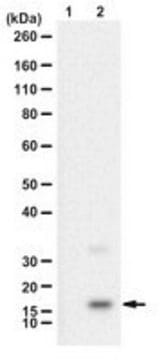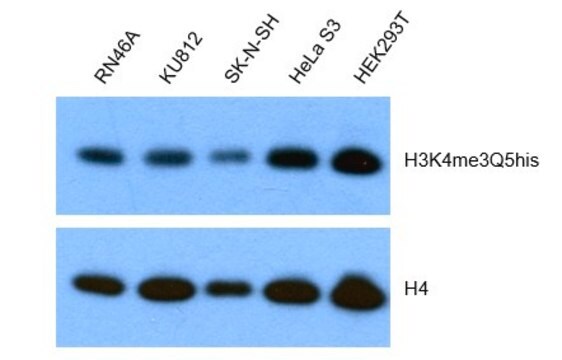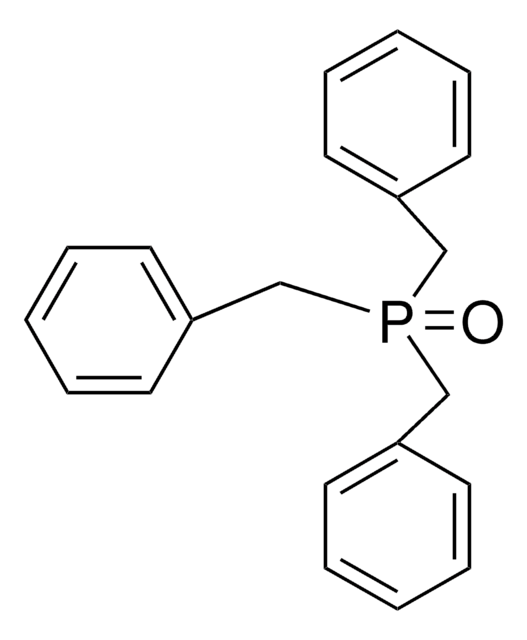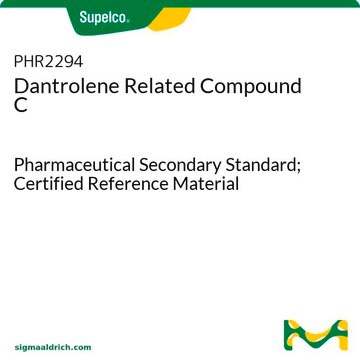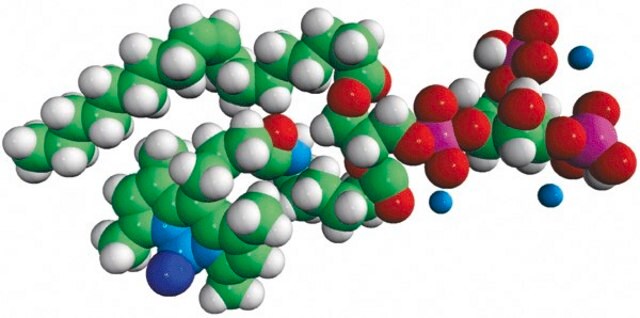ABE2578
Anti-H3Q5histaminyl
Sinónimos:
Histone H3Q5;H3Q5;Histone H3 glutamine5 Histaminyl
About This Item
Productos recomendados
biological source
rabbit
Quality Level
conjugate
unconjugated
antibody form
purified antibody
antibody product type
primary antibodies
clone
polyclonal
mol wt
calculated mol wt 15.51 kDa
observed mol wt ~16 kDa
species reactivity
human
species reactivity (predicted by homology)
bovine, monkey
packaging
antibody small pack of 100 μL
technique(s)
dot blot: suitable
western blot: suitable
isotype
IgG
epitope sequence
N-terminal
Protein ID accession no.
UniProt accession no.
shipped in
ambient
target post-translational modification
histaminylation (Gln6)
Gene Information
human ... HIST3H3(8290)
General description
Specificity
Immunogen
Application
Evaluated by DOT Blot analysis with H3Q5Histaminyl peptide
Dot Blot Analysis: A 1:1,000 dilution of this antibody detected H3Q5Histaminyl peptide, but not the unmodified H3Q5 peptide.
Tested Applications
Western Blotting Analysis: A representative lot detected H3Q5histaminyl in lysate from Transglutaminase 2 (TGM2) overexpressing HEK293T cells treated with Histamine, but not in untreated cells or in cells treated with Serotonin or Dopamine. (Data courtesy of Dr. Ian Maze′s Lab, Icahn School of Medicine at Mount Sinai, New York).
Western Blotting Analysis: A 1:1,000 dilution of this antibody detected Histone H3Q5histaminyl in lysates from HEK293T cells over expressing TGM2 and treated with histamine, but not in untreated cells.
Dot Blot Analysis: A 1:1,000 dilution of a representative lot of this antibody detected H3Q5histaminyl peptide, but not serotonin or dopamine modified peptides. (Data courtesy of Dr. Ian Maze s Lab, Icahn School of Medicine at Mount Sinai, New York).
Activity Assay (In vitro): A representative lot of this antibody detected the recombinant Histone H3.3 histaminylated on glutamine 5 following in vitro transamidation reaction in the presence of histamine. (Data courtesy of Dr. Ian Maze Lab, Icahn School of Medicine at Mount Sinai, New York).
Note: Actual optimal working dilutions must be determined by end user as specimens, and experimental conditions may vary with the end user
Physical form
Storage and Stability
Other Notes
Disclaimer
¿No encuentra el producto adecuado?
Pruebe nuestro Herramienta de selección de productos.
Storage Class
12 - Non Combustible Liquids
wgk_germany
WGK 1
flash_point_f
Not applicable
flash_point_c
Not applicable
Certificados de análisis (COA)
Busque Certificados de análisis (COA) introduciendo el número de lote del producto. Los números de lote se encuentran en la etiqueta del producto después de las palabras «Lot» o «Batch»
¿Ya tiene este producto?
Encuentre la documentación para los productos que ha comprado recientemente en la Biblioteca de documentos.
Nuestro equipo de científicos tiene experiencia en todas las áreas de investigación: Ciencias de la vida, Ciencia de los materiales, Síntesis química, Cromatografía, Analítica y muchas otras.
Póngase en contacto con el Servicio técnico